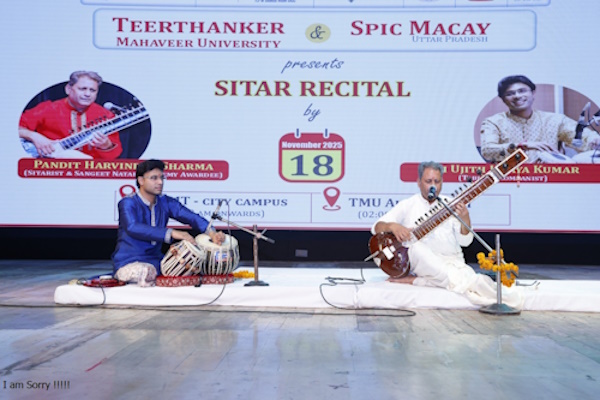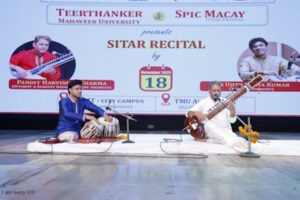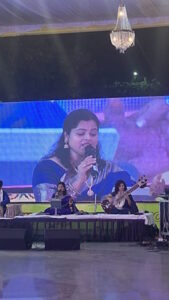Bhimsen Joshi was the pillar of the grocery family.
Pandit Bhimsen Joshi may not be in this world today but his work in classical music will always keep him alive. Bhimsen Joshi is the name of a personality who is a milestone in the world of classical singing. It is not easy to touch the new dimensions that he created with his singing.
He was born in ‘Gadag’, Karnataka on 4 February 1922. His father ‘Gururaj Joshi’ was the headmaster of a high school there and an accomplished scholar of Kannada, English and Sanskrit. His uncle GB Joshi was a famous playwright and had encouraged the beautiful literary collection of Dharwad.
His grandfather was a famous kirtankar. Although Pandit Bhimsen Joshi was a performer of all the genres of singing, but basically he was the pillar of Kirana Gharana singing. Kirana Gharana is believed to be associated with Kairana in Shamli district of Uttar Pradesh.
Although there is no artist of Kirana Gharana in Kairana now, it is believed that Kirana Gharana originated from here. Even though he was born in Karnataka, his singing was associated with Kirana (Kairana). Pandit Bhimsen Joshi started singing at the age of 19 and continued singing classical music for seven decades. Bhimsen Joshi made not only Karnataka but the entire country proud with his singing.
Earlier in the field of Indian music, M.S. Subbulakshmi, Ustad Bismillah Khan, Pandit Ravi Shankar and Lata Mangeshkar have been awarded ‘Bharat Ratna’. The basis of Bhimsen Joshi’s ability is his great musical practice. He was counted among the great singers of Hindustani classical music popular in the country and abroad. There is hardly any stage in the country or abroad where he has not spread the magic of his singing.
The special thing is that with his solo singing, Pandit Bhimsen Joshi ushered in a new era of Hindustani classical music. He was the sixth person from the world of art and culture to be awarded the country’s highest civilian honor ‘Bharat Ratna’. Bhimsen Gururaj Joshi of ‘Kirana Gharana’ created a wonderful rendition with his different styles of singing. He was very fond of music since childhood. He was greatly influenced by Abdul Karim Khan, the founder of Kirana Gharana.
One thing is also discussed about this. In 1932 he left home in search of a Guru. For the next two years he lived in Bijapur, Pune and Gwalior. He also took music lessons from Ustad Hafiz Ali Khan of Gwalior. But he took formal initial education in classical music from Pandit Rambhau Kundalkar, disciple of Abdul Karim Khan. Before returning home he also visited Calcutta and Punjab. Seven years before this, Shehnai player Ustad Bismillah Khan was decorated with Bharat Ratna. In the year 1936, Pandit Bhimsen Joshi also learned the nuances of Khayal singing from the famous Khayal singer Sawai Gandharva for many years. Along with singing Khayal, he also had expertise in Thumri and Bhajan.
Bhimsen married twice. His first wife was Sunanda Katti, daughter of his maternal uncle. His first marriage took place in 1944. He had four children from Sunanda, Raghavendra, Usha, Sumangala and Anand. In 1951, he married Vatsala Mudholkar, his co-star in the Kannada drama Bhagya-Shri. At that time, second marriage among Hindus was legally illegal in Bombay province, hence he went to live in Nagpur, where second marriage was acceptable.
But neither did he divorce nor separate from his first wife. He also had three children from Vatsala, Jayant, Subhada and Srinivas Joshi. With time, after some time, both his wives started living together and both the families also became one. But when he felt that this was not right, his first wife separated and started living in a rented house in Limavadi, Sadashiv Peth, Pune.
Not satisfied with his music education, Bhimsen ran away to Gwalior and took admission in ‘Madhav Sangeet Vidyalaya’ there. He met Vinayakrao Patwardhan in ‘Karvallabh Sangeet Sammelan’ of Gwalior. Vinayakrao was surprised that Sawai Gandharva lived very close to his house. Sawai Gandharva, listening to Bhimsen, said, “I will teach him if he can forget everything he has learned so far.” Similarly, as a result of the knowledge he gained from the cooperation and learning of many knowledgeable people including Inayat Khan, Shyamacharya Joshi etc., he gained fame as a great musician.
In the year 1941, Bhimsen Joshi made his first performance on stage at the age of 19. His first album came out at the age of 20, which contained some religious songs in Kannada and Hindi. Two years later, he started working as a radio artist in Mumbai. Bhimsen Joshi used to present amazing singing by combining the qualities of different gharanas. Joshi ji was considered one of the most famous singers of Kirana Gharana. He is especially known for his Khayal style and bhajan singing. Pandit Bhimsen Joshi also sang songs for many films. He sang for many films like ‘Tansen’, ‘Sur Sangam’, ‘Basant Bahar’ and ‘Ankahi’.
Pandit Bhimsen Joshi enriched the Kirana Gharana by developing his own unique style and also incorporated the specialties of other Gharana in his singing. It goes to his credit that he created new ragas like Kalashree and Lalit Bhatiyar by combining many ragas. Along with singing Khayal, he has also mastered Thumri and Bhajan. Pandit Bhimsen Joshi died on 24 January 2011.
He presented his singing for the first time in January 1946 in Pune on the 60th birthday of his guru Sawai Gandharva. The songs sung by him Piya Milan Ki Aas, Jo Bhaje Hari Ko Sada and Mile Sur Mera Tumhara became very famous. Joshi ji is known for singing Khayal, Bhajan and Abhang. Influenced by classical singers like Mrs. Keshar Bai Kerkar, Begum Akhtar and Ustad Aamir Khan, Pandit Joshi belonged to the Kirana Gharana. Sudha Kalyan, Miya Ki Todi, Puriya Dhanashree, Multani, Bhimpalashi, Darwari and Ramkali ragas were his specialties. The listeners used to sit for hours, mesmerized by the rhythms and verses, enjoying Indian classical music. Pandit Joshi was mainly known for Kannada, Hindi and Marathi bhajans.
His divine voice peels back layers of different planes of pain and ecstasy with equal ease. With the same enthusiasm with which he used to present big ragas like ‘Todi’ and ‘Kalyan’ in variety, he used to perform their smaller forms, ragas ‘Bhoop’ and ‘Abhogi’ with the same enthusiasm. In both these different situations, the listener could experience the depth and power of his singing which kept accumulating layers within him. He knew very well what sacrifices were necessary to take up singing.
That is why many times he used to be cruel and turn away from sweetness in his speech. His alap, edge and bandish are proportionate and controlled. While in Khayal singing, his singing is as vast as the ocean, whereas in Bhaavgeet, Thumri, Bhajan and Abhang, he is fragrant with simplicity. In many of his bhajans and Marathi abhangas, just the pronunciation of Ram or Sitaram leaves one in shock. It seems that Vitthal himself is singing in his voice. Joshiji was a purist singer but he did not limit himself to any limits.
He sang for cinema, sang with playback singers. When singers like Lata and Manna Dey expressed hesitation in singing with him, he also encouraged them. Manna Dey was not ready to sing with him in the film Basant Bahar. The song was, Ketaki Gulab Juhi Champak Van Phule. Then Joshiji encouraged Manna Dey.
Had so much love since childhood
The story is of Ron in Dharwad district. A small place in Karnataka. A child used to be late in coming from school every day. Father Gururaj was worried. He asked several times but the child avoided it. The father was worried whether his son had fallen into bad company. One day he went to the market to buy some things. There was a gramophone shop in the market. When Gururaj ji passed from the front, the shopkeeper called him and said, Master, your son sings very well. Gururaj ji was shocked.
The shopkeeper asked him, “Hey, don’t you know that your son sings?” Gururaj ji did not understand what the shopkeeper was saying. He asked when did you hear my son singing? The shopkeeper told that he comes and sits at the shop as soon as the school closes. I play a record for him. He has listened to a record many times. He has memorized everything. He now sings exactly the way it is sung on the record. This was the first time when Gururaj Joshi came to know that his son Bhimsen sings.
Died :
Bharat Ratna Pandit Bhimsen Joshi, a famous singer of Hindustani musical music, died at the age of 89 in Sahyadri Hospital, Pune. He was ill for two years. His condition had remained critical for the last several days. Joshi Khayal was famous for singing and bhajans.
Interesting facts:
• In childhood, while returning from school, Panditji used to stop at the gramophone record shop and listen to songs.
• At the age of just 11, Panditji left home in search of a Guru.
• Apart from singing, Panditji has also taken great care of his body through exercise.
• Sawai Gandharva was very strict in teaching singing, the effect of which was visible in Panditji’s singing also.
• He used to perform lost in himself so that every note sounded absolutely tight.
• At the age of just 19, he started giving stage performances.
• Abhogi, Puriya, Darbari, Malkauns, Todi, Lalit, Yaman, Bhimpalasi, Shuddh Kalyan etc. were Panditji’s favorite ragas.
• Apart from this, Majhe Maher Pandhari in Abhang, Pandhari Chawas and Jo Bhaje Hari Ko Sada Thumri Piya Ke Milan Ki Aas in Bhajan are quite famous.
• Panditji was fond of eating paan mixed with tobacco and was also fond of driving a car.
• Emperor of Khayal singing, U. Ameer Khan Saheb had also said about Panditji that after me, he will take Khayal singing much further.
Award:
• 1972 – Padma Shri
• 1976 – Sangeet Natak Akademi Award
• 1985 – Padma Bhushan
• 1985 – National Film Award for Best Male Playback Singer
• 1986 – “First platinum disc”
• 1999 – Padma Vibhushan
• 2000 – “Aditya Vikram Birla Kalashikhar Award”
• 2002 – Maharashtra Bhushan
• 2003 – “Swathi Sangeeta Puraskaram” of Kerala Government
• 2005 – Karnataka Ratna Award from the Government of Karnataka
• 2009 – Bharat Ratna
• 2008 – “Swami Haridas Award”
• 2009 – “Lifetime Achievement Award” of Delhi Government
• 2010 – “S Hwy Narayanaswami Rao National Award” of Rama Seva Mandali, Bangalore.
Pt. Bhimsen Joshi engrossed in the thought of new creation.
Share this content:












Post Comment